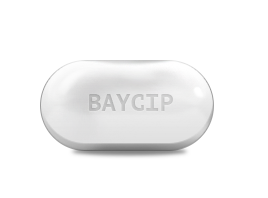we accept  Baycip
Baycip

Baycip - the drug, which is highly effective at infections of urinary tracts; at intake it quickly gets into kidneys, has a long-term effuse, has bactericidal effect on Pseudomonasaeruginosa. Drug is prescribed at treatment of oncological patients. It is prescribed when it is diagnosed different respiratory infections, of skin and soft tissues, bones and joints, digestive tract, including the infections caused by a salmonella, a shigella, campylobacters.
- Availability: In Stock (89 packs)
- Active Ingredient: ciprofloxacin
| Package | Per Pill | Savings | Per Pack | Order |
|---|---|---|---|---|
| 60 pills | $53.82 | |||
| 90 pills | $0.70 | $17.76 | $80.73 $62.97 | |
| 120 pills | $0.60 | $35.52 | $107.64 $72.12 | |
| 180 pills | $0.50 | $71.04 | $161.46 $90.42 | |
| 270 pills | $0.44 | $124.32 | $242.19 $117.87 | |
| 360 pills | $0.40 | $177.59 | $322.92 $145.33 |
Baycip (Ciprofloxacin)
Baycip product description
Baycip is an antimicrobial agent of a broad spectrum of action. It has a bactericidal effect, the mechanism of which is due to the inhibition of the enzyme DNA-gyrase bacteria. The main component of Baycip is Ciprofloxacin.
Baycip is used for such diseases:
- diseases of the skin and soft tissues;
- bones and joints;
- bacterial infections of the biliary tract and gallbladder;
- viruses of the pelvic organs (prostatitis, adnexitis, gonorrhea);
- abdominal cavity organs;
- paranasal sinuses and middle ear;
- gastrointestinal tract;
- urinary tract and kidney;
- respiratory tract;
- eye;
- sepsis.
Also, the drug is used to treat postoperative diseases. Baycip is used in persons with immunodeficient conditions for the therapy and avoidance of infections.
Pills are swallowed completely and washed down with a small amount of liquid. The drug can be consumed regardless of the meal, but noted that doing it on an empty stomach is better for an acceleration of the assimilation of Baycip.
The duration of taking remedy will depend on the results of bacteriological studies, the course, and severity of the disease. It is suggested to continue taking medicine for at least three days after the disappearance of clinical symptoms and the normalization of temperature indicators in the patient. It is necessary to avoid simultaneous reception of the drug with products enriched with calcium (juices with a high content of calcium, yogurt, and milk). Conventional products, including calcium, do not affect the absorption of Ciprofloxacin.
Baycip safety information
Baycip contraindicated in hypersensitive to ingredients of the drug: there were occasions when severe hepatic renal failure migrated the tendinitis that arose from the use of quinolones.
In addition, Baycip is forbidden during lactation and pregnancy, it is not allowed for children under the age of twelve.
Interaction with other drugs and alcohol
Simultaneous reception Baycip may lead to increased concentrations of theophylline in the blood, as well as to increase its half-life.
Baycip clearance slows down when taking probenecid. Antacids containing aluminum hydroxide and/or magnesium hydroxide are able to slow the absorption of the drug Baycip. This leads to a decrease in the concentration of medicine in the urine and blood plasma. That is why the interval between the uses of this medication should not be less than 4 hours.
Baycip can potentiate the influence of anticoagulants coumarinic. It is forbidden to drink alcohol while using the drug Baycip.
Overdose
Reversible toxic damage to the renal parenchyma was observed due to an overdose of Baycip in some cases.
Baycip side effects
Baycip can cause such types of side conditions, as dizziness, nausea, abdominal pain, diarrhea, flatulence, vomiting, headache, agitation, and tremor. In rare cases, there is arterial hypertension, itching, skin rash. In isolated cases, sweating, peripheral sensory disorders, hot flashes, enlarged intracranial pressure, a sense of fear, depression, vision disorders, hepatitis, and tachycardia are observed.
In extremely rare instances Baycip causes bronchospasm, angioedema, arthralgia, anaphylactic shock, vasculitis, petechiae, Lyell syndrome, Stevens-Johnson syndrome, anemia, leukopenia, eosinophilia, hemolytic anemia, thrombocytopenia, increased bilirubin, creatinine, alkaline phosphatase, hepatic transaminase may occur.
